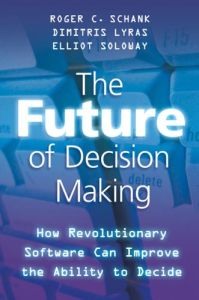Melden Sie sich bei getAbstract an, um die Zusammenfassung zu erhalten.

Melden Sie sich bei getAbstract an, um die Zusammenfassung zu erhalten.
Roger C. Schank, Dimitris Lyras and Elliot Soloway
The Future of Decision Making
How Revolutionary Software Can Improve the Ability to Decide
Palgrave Macmillan, 2010
Was ist drin?
You can make better decisions – but only if you move past rules and logic.
Recommendation
Education engineering experts Roger C. Schank, Dimitris Lyras and Elliot Soloway apply their knowledge of cognitive science, computer software and industry to a single purpose: helping you make better decisions. They directly challenge using logic and rationality as they argue for “case-based reasoning.” Their writing is exceptionally clear, which makes the book easy to follow. Its only weakness is that the authors are so positive you can improve your decision making through software that they sometimes make it sound easier than it might be. That aside, this first-rate book’s counsel applies to all fields. getAbstract particularly recommends it to corporate leaders, software designers and those involved in knowledge management.
Summary
About the Authors
Roger C. Schank is a professor emeritus at Northwestern University. Dimitris Lyras founded Ulysses-Systems, a software consultancy. Elliot Soloway is a professor of engineering, information and education at the University of Michigan.





















Comment on this summary
DH, Owner, Don Hall & Assoc.